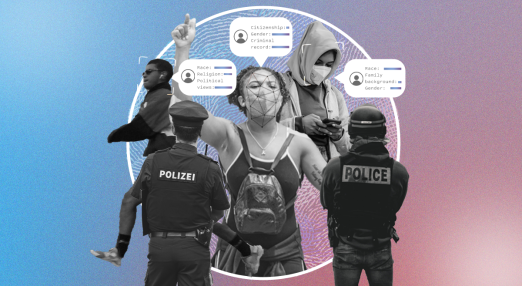Post-Brexit data protection laws are coming, and we should all be concerned about it
The UK Government are expected to reveal their Post-Brexit data protection bill on 10 May. They are proposing a framework that frames personal data in terms of economic assets and aims to "cut red tape" to promote their commercial use. These ideas draw considerable support among corporate lobbyists and large technology companies, which would no doubt leverage the "UK example" to advocate for weaker data protection standards in Europe. In turn, understanding and opposing these changes should not be seen as a domestic issue, but as a major threat for digital rights advocates across the globe.
Filter resources
-

Post-Brexit data protection laws are coming, and we should all be concerned about it
The UK Government are expected to reveal their Post-Brexit data protection bill on 10 May. They are proposing a framework that frames personal data in terms of economic assets and aims to "cut red tape" to promote their commercial use. These ideas draw considerable support among corporate lobbyists and large technology companies, which would no doubt leverage the "UK example" to advocate for weaker data protection standards in Europe. In turn, understanding and opposing these changes should not be seen as a domestic issue, but as a major threat for digital rights advocates across the globe.
Read more
-

Threat to the protection of personal data in Belgium: European civil society is concerned
EDRi, alongisde multiple civil society organisations, is the signatory of an open letter addressed to the Belgian Parliament, demanding better enforcement of the European data protection rules and guarantees of political independence of the Belgian Data Protection Authority.
Read more
-

When the political party votes for you: Can we have a fair election with surveillance political advertising?
A new regulation on online advertising was proposed last December to address political ads, which identifies in one definition, two techniques to deliver political ads: targeting and amplification.
Read more
-

Copyright: European Court of Justice strictly limits the use of upload filters
“Today’s ruling sets an important precedent for the protection of freedom of expression online. Nevertheless, it does not go far enough. The European Court of Justice does not completely rule out the use of upload filters to enforce copyright on online platforms. At least, however, the court confirms what civil society has been emphasizing for years: upload filters are unable to reliably distinguish between copyright infringements and legitimate forms of free expression such as parodies or quotations. It is therefore right that the highest court limits the use of upload filters under Article 17 of the EU Copyright Directive to uploads that constitute manifest infringements, such as uploads of entire movies.”
Read more
-

Irish DPC burns taxpayer money over delay cases
Irish DPC to pay tens of thousands in legal costs over 47 months delay in cases against WhatsApp and Instagram
Read more
-

Putting the brakes on Big Tech’s uncontrolled power
Will 2022 go down as the year the EU tamed Big Tech? In the very early morning hours of Saturday, 23 April, after 16 hours of final negotiations, EU lawmakers reached an agreement on the Digital Services Act (DSA), which is certainly a watershed moment for our digital future. As the deal reached is a top-level political agreement, the final text of the law is yet to be released.
Read more
-

Civil society reacts to European Parliament AI Act draft Report
This joint statement evaluates how far the IMCO-LIBE draft Report on the EU’s Artificial Intelligence (AI) Act, released 20th April 2022, addresses civil society's recommendations. We call on Members of the European Parliament to support amendments that centre people affected by AI systems, prevent harm in the use of AI systems, and offer comprehensive protection for fundamental rights in the AI Act.
Read more
-

The EU’s Artificial Intelligence Act: Civil society amendments
Artificial Intelligence (AI) systems are increasingly used in all areas of public life. It is vital that the AI Act addresses the structural, societal, political and economic impacts of the use of AI, is future-proof, and prioritises affected people, the protection of fundamental rights and democratic values. The following issue papers detail the amendments of civil society following the Civil Society Statement on the AI Act, released in November 2021.
Read more
-

Europol’s new powers will enable Big Data analysis and mass surveillance. We say NO!
The European Parliament is soon to vote on the new Europol reform which aims to expand the law enforcement agency’s powers without any accountability and with as few fundamental rights safeguards as possible. To influence the vote, EDRi has mobilised civil society organisations in a joint advocacy action of reaching out directly to members of the European Parliament to urge them to vote against the proposal.
Read more
-

EU negotiators approve good DSA, but more work is needed to build a better internet
Friday night’s political agreement on the Digital Services Act (DSA) is a good first step towards protecting people’s rights on the internet and to some extent limiting the immense power that Big Tech companies have over people and democracies.
Read more
-

Internal documents revealed the worst for private communications in the EU; how will the Commissioners respond?
EDRi, Europe's biggest network for rights and freedoms across Europe and beyond, urge the European Commission to not put forward a CSAM proposal that would undermine the CJEU prohibition of general monitoring or subject Europeans to monitoring that would turn their devices into spyware.
Read more
-

The European Parliament must go further to empower people in the AI act
Today, 21 April, POLITICO Europe published a leak of the much-anticipated draft report on the Artificial Intelligence (AI) Act proposal. The draft report has taken important steps towards a more people-focused approach, but it has failed to introduce crucial red lines and safeguards on the uses of AI, including ‘place-based’ predictive policing systems, remote biometric identification, emotion recognition, discriminatory or manipulative biometric categorisation, and uses of AI undermining the right to asylum.
Read more
